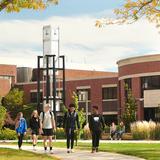- The mission of Monroe Community College is to provide a high quality learning environment to a diverse community. In offering education and training opportunities, student success is the College's highest priority; as such, the College is committed to access, teaching excellence, comprehensiveness, lifelong learning, partnership building and economic development.
School Highlights
Monroe Community College serves 19,441 students (28% of students are full-time).
The college's student:teacher ratio of 18:1 is higher than the state community college average of 13:1.
Minority enrollment is 41% of the student body (majority Black and Hispanic), which is less than the state average of 62%.
Quick Stats (2025)
- Enrollment: 19,441 students
- In-state tuition: $4,150
- Out-state tuition: $7,566
- Student:teacher ratio: 18:1
- Minority enrollment: 41%
- Source: Integrated Postsecondary Education Data System (IPEDS)
Top Rankings
Monroe Community College ranks among the top 20% of public schools in New York for:
Category
Attribute
Affordability
Community Size
Debt For Students
School Overview
The teacher population of 1,101 teachers has stayed relatively flat over five years.
Monroe Community College
(NY) Community College Avg.
Carnegie Classification
Associate's Colleges: Mixed Transfer/Career & Technical-High Nontraditional
Baccalaureate/Associate's Colleges: Mixed Baccalaureate/Associate's
Institution Level
At least 2 but less than 4 years
At least 2 but less than 4 years
Institution Control
Public
Private not-for-profit
Total Faculty
1,101 staff
158 staff
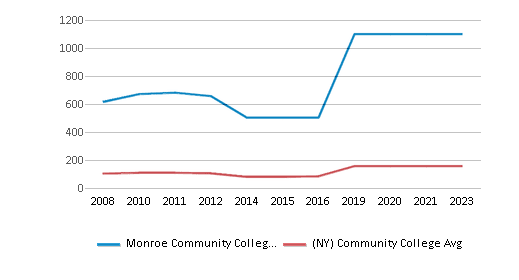
School Calendar
Student Body
The student population of Monroe Community College has grown by 68% over five years.
The student:teacher ratio of 18:1 has increased from 9:1 over five years.
The Monroe Community College diversity score of 0.61 is less than the state average of 0.76. The school's diversity has stayed relatively flat over five years.
Total Enrollment
19,441 students
746 students
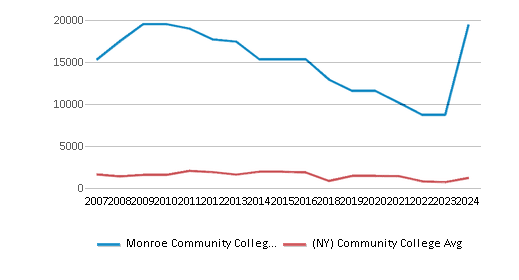
Student : Teacher Ratio
18:1
13:1
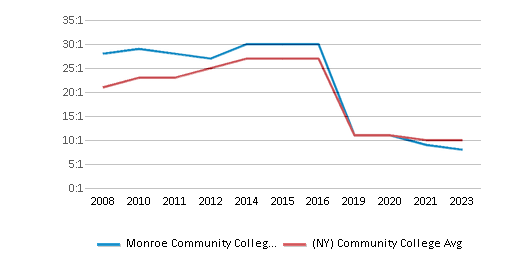
# Full-Time Students
5,424 students
519 students
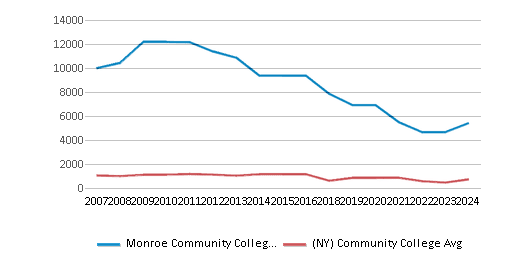
# Part-Time Students
14,017 students
514 students
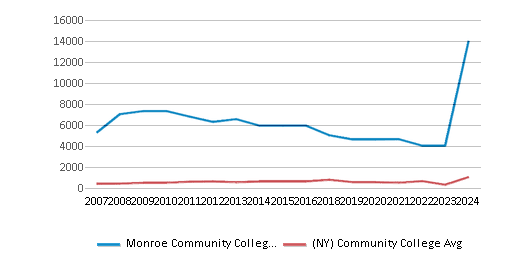
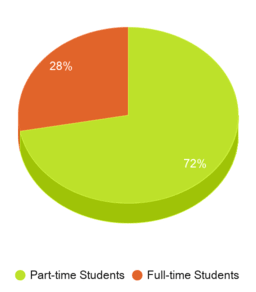
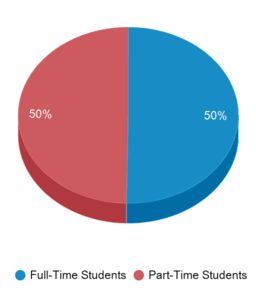
# Enrollment Undergraduate
194 students
357 students
# Full-Time Undergraduate Students
5,424 students
502 students
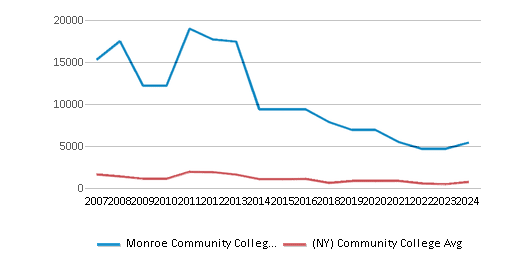
# Full-Time Graduate Students
n/a
44 students
# Part-Time Undergraduate Students
14,017 students
528 students
# Part-Time Graduate Students
n/a
41 students
Total Dormitory Capacity
772 students
382 students
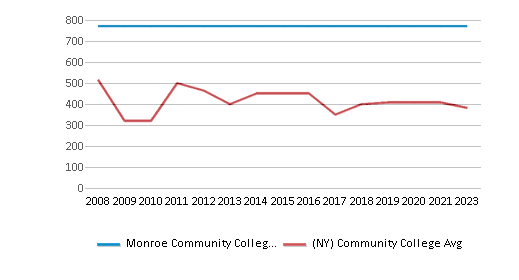
% American Indian/Alaskan
n/a
n/a
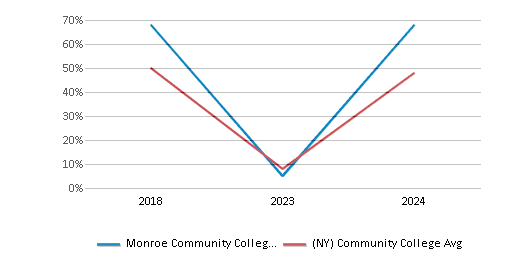
% Asian
5%
8%
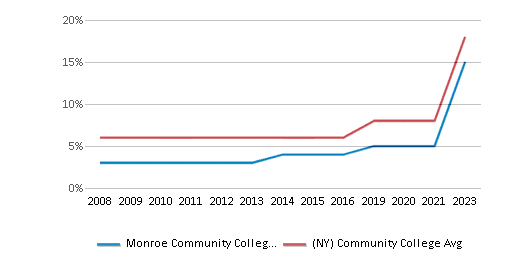
% Hispanic
11%
23%
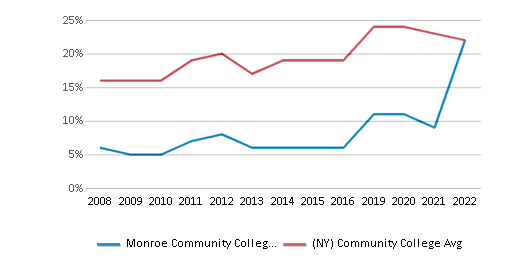
% Black
16%
18%
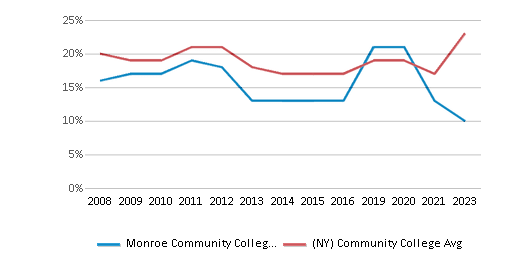
% White
59%
38%
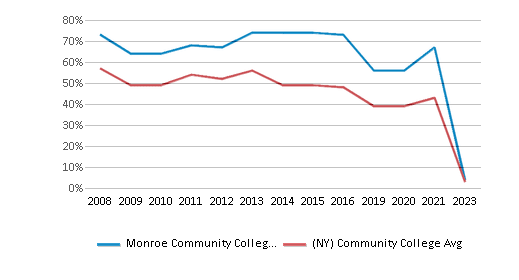
% Hawaiian
n/a
2%
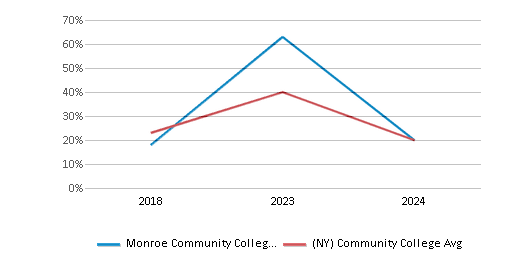
% Two or more races
4%
3%
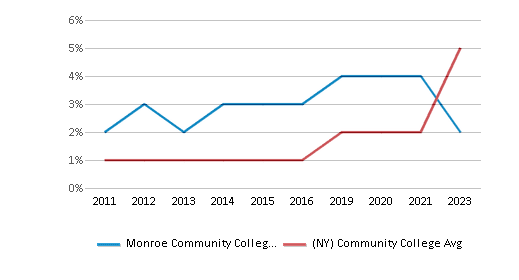
% Non Resident races
1%
3%
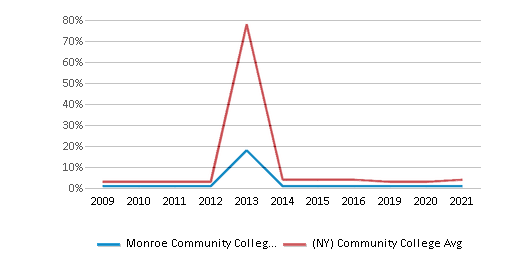
% Unknown races
4%
5%
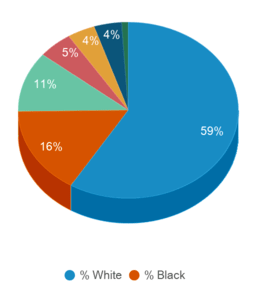
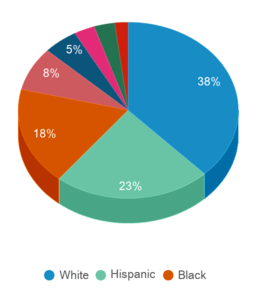
Diversity Score
0.61
0.76
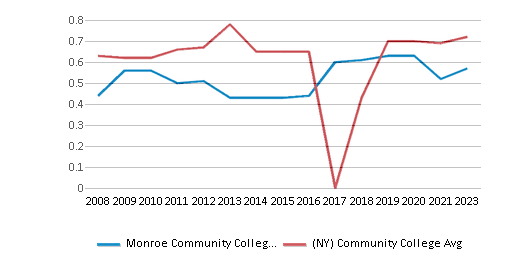
College Completion Rate (Students who graduate in less than 4 years)
0.2132%
0.3518%
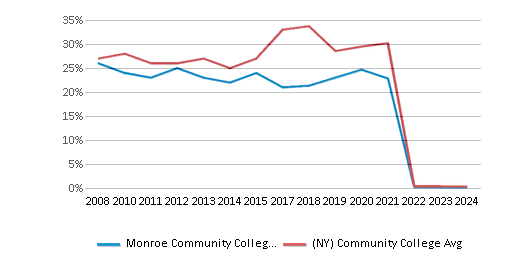
College Completion Rate (Students who graduate in 4 years or more than 4 years)
n/a
0.3957%
Average Graduate Earnings (10 Years)
$34,300
$35,200
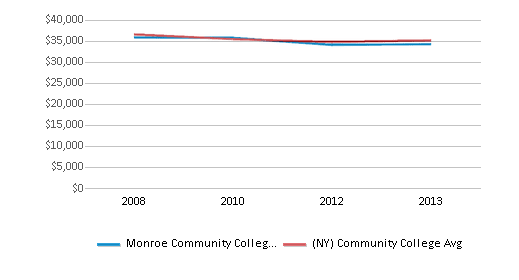
Tuition and Acceptance Rate
The public in-state tuition of $4,150 is less than the state average of $5,720. The in-state tuition has declined by 26% over four years.
The public out-state tuition of $7,566 is less than the state average of $10,320. The out-state tuition has declined by 27% over four years.
In-State Tuition Fees
$4,150
$5,720
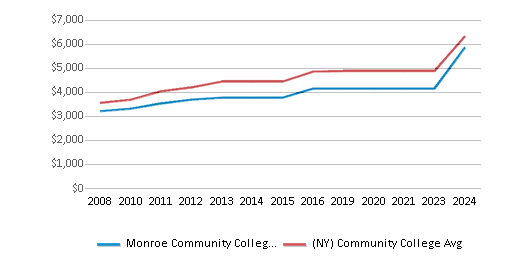
Out-State Tuition Fees
$7,566
$10,320
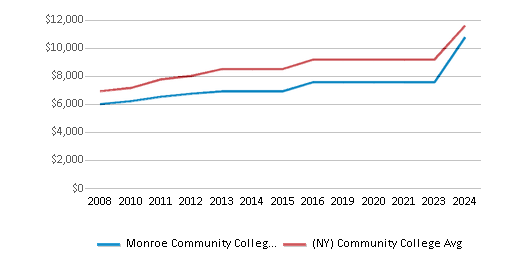
% Students Receiving Some Financial Aid
79%
88%
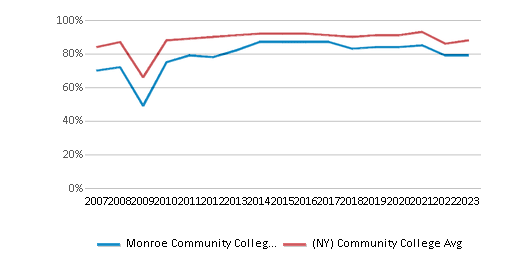
Median Debt for Graduates
$10,000
$13,841
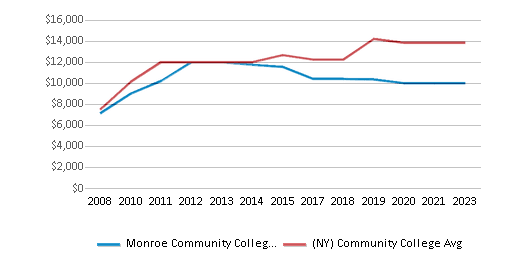
Median Debt for Dropouts
$5,500
$5,500
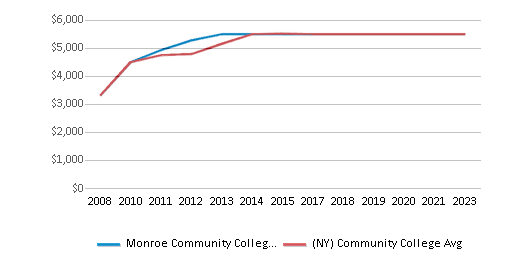
Acceptance Rate
n/a
74%
SAT Reading
n/a
475
SAT Math
n/a
505
SAT Writing
n/a
485
ACT Composite
n/a
20
ACT English
n/a
18
ACT Math
n/a
20
Source: 2024 (or latest year available) Integrated Postsecondary Education Data System (IPEDS) , School Administrators
School Notes
- In the early 1960's, community leaders became concerned about the education of nurses in the Rochester area. Led by local physician Dr. Samuel J. Stabins, they established Monroe Community College as an educational institution which would prepare students to work in local hospitals and health care facilities. MCC became part of the State University of New York system, and its program offerings were expanded to prepare graduates for a wide range of job fields or transfer to four-year institutions. MCC's first class - 720 students - enrolled in September, 1962. Since then, enrollment has increased steadily and new programs have been developed to meet the changing requirements of the local community. The college Opened new four rink ESL Sports Centre in September 1998, Damon City Campus at Rochester in 1992 and Applied Technologies Center in early 1997. MCC's Brighton Campus is located on a 300-acre site at the junction of routes 390 and 590, just outside the city limits of Rochester, New York. The two newest academic buildings, opened in 1993, add modern learning facilities and electronic classrooms to the College's instructional space. The campus also includes a communications building, a 500-seat theater, art gallery and a large health and physical education complex with indoor pool and fitness center. A child care center is located on the campus, a short walk from the academic buildings. MCC is accredited by the Middle States Association of Colleges and Secondary Schools. Curricula are registered and approved by the New York State Department of Education. The College is a member of the League for Innovation in the Community College.
Frequently Asked Questions
How much does Monroe Community College cost?
Monroe Community College's tuition is approximately $4,150 for In-State students and $7,566 for Out-State students.
What is Monroe Community College's ranking?
Monroe Community College ranks among the top 20% of community college in New York for: Least expensive tuition, Largest student body and Least debt for graduating students.
Recent Articles

Obtaining Your Bachelor's Degree at a Community College
Explore the evolving landscape of community colleges offering bachelor's degrees, addressing affordability, accessibility, and workforce needs.

A to Z of Community College Certificates and Courses
From business and healthcare to technology and skilled trades, the article showcases the breadth of options available to students seeking to enhance their knowledge, develop new skills, or pursue career advancement.

What is a Community College?
This comprehensive guide explains what a community college is, its history, and its role in higher education. It covers the types of programs offered, differences from four-year colleges, benefits of attending, and important considerations for prospective students, providing valuable insights for those exploring educational options.

